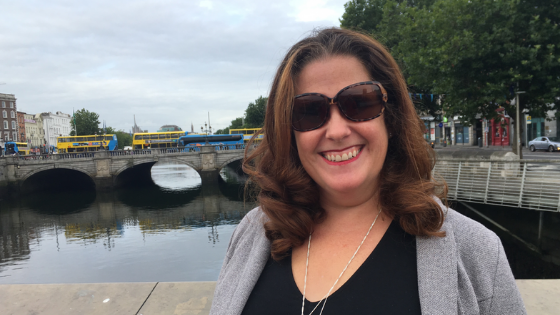We are delighted to welcome Dr Meghan Marrero to NCI. She has generously agreed to take the time to blog about her work here in Dublin.
Getting to know you...
This term, I am a Fulbright Scholar here at NCI, working with the teams in both Learning and Teaching and the Early Learning Initiative (ELI). I will be working on several projects in the realm of science, technology, engineering, and mathematics (STEM) education, with a focus on STEM for young children. NCI’s Centre for Learning and Teaching will host a conference in November to bring together student and professionals in early years education around the topics of inquiry and play for young learners. Conference attendees will engage in a variety of hands-on activities, and I will also serve as a keynote speaker, sharing research on the importance of STEM education in early childhood. I will also be working with ELI to implement the Family Learning for Outreach and Research in Education and STEM (FLORES) programme, an initiative to promote STEM for families of young children, in inner city schools in Dublin.
What is Fulbright?
The Fulbright Scholar Programme is sponsored by the United States Department of State and the Bureau of Educational and Cultural Affairs. Fulbright Scholars are typically academics teaching and/or conducting research in their field of expertise at institutions in countries around the world. The aim of Fulbright is to promote academic and cultural exchange across political boundaries. Scholars spend two to twelve months abroad, and there are also awards for students, teachers, artists, and other professionals to expand their horizons and share their work. Ireland and the United States have a unique relationship around Fulbright. In addition to welcoming American students and scholars, the Irish Commission also supports students and scholars from Ireland to study in the States.
Who am I?
I describe myself as an ocean lover and science nerd. My passion for the ocean led me to earn a B.S. in biology with a concentration in marine science at Cornell University, but more significantly to spend a semester at sea on a schooner, sailing up the East Coast of the U.S. as I learned marine science, navigation, and many life lessons. These experiences led me to pursue a career in education, teaching others about the importance of the ocean in our Earth system, and recognizing how important the STEM disciplines are in protecting the ocean’s resources. I later earned my Master’s and doctorate in science education from Teachers College, Columbia University.
My love of the ocean and passion for science and education have undoubtedly led to my current role as President of the National Marine Educators Association (NMEA) in the United States, which is a professional organization of nearly 1000 members. Our members include teachers, informal educators, college lecturers, scientists, government professionals who are committed to our mission of, “making known the world of water, both fresh and salt.” The NMEA network has connected me with like-minded educators across the United States and the globe, and has been an invaluable resource throughout my career.
At my home institution, Mercy College, in New York, I am a Professor of Secondary Education, and the co-Director of the Mercy College Center for STEM Education (CSE). I teach classes in science education methods, oceanography, and educational assessment and evaluation for post graduate students. I also support our teacher candidates in their clinical practice, teaching the seminar that coincides with their student teaching experiences. I also serve as project director or on the leadership team of several large federal and foundation grants that support STEM teacher preparation and professional development.
Previously, I was a secondary science teacher, teaching courses in biology, earth science, and marine science at a high school in New York City. These experiences led to a position as a curriculum director and professional developer with U.S. Satellite Laboratory, an educational technology company committed to improving STEM education for primary and secondary students. I worked on many projects at U.S. Satellite, and was the lead author for a high school marine science textbook programme that integrates technological tools and authentic ocean data.
What does the Center for STEM Education do?
The focus of the CSE is providing STEM outreach for children, as well as primary and secondary schoolteachers. For teachers, we offer diverse professional development workshops, providing hands-on experiences to improve pedagogical skills in areas such as inquiry-based teaching and learning, infusing technological tools in the classroom, authentically integrating the STEAM (STEM + arts!) subjects in primary school, and using coding to teach computational thinking. Teachers are also invited to participate in networking events such as STEM Teacher Socials, which allow for casual conversations and learning in settings such as nature centres and maker spaces.
For children, the Saturday STEM Academy brings the STEM subjects to life. Saturday STEM is a series of four workshops on the Mercy College campus which provide STEM enrichment for kids beyond what is typically available in their school districts. Secondary students can discover brain development in chick embryos in our state-of-the-art neuroscience laboratories, or work as sound engineers in the commercial-grade sound studio as they study the physics of sound and music. The youngest learners explore STEM through play, nature walks, and age-appropriate coding and engineering activities.
The FLORES programme, as noted above, is geared for young children and their families. Parents and children work together in science, engineering, and technology activities with a focus on seeing STEM in everyday life. The CSE has successfully implemented FLORES in several school districts in New York, and looks forward to adapting the programme for Dublin families this autumn.
While the CSE provides outreach to many learners, our focus is on providing opportunities for those who have traditionally underrepresented in the STEM subjects, including women, minorities, and those with limited English proficiency. The CSE receives federal, foundation, and private funding to make these opportunities a reality.
What’s next?
Thanks to the Fulbright award, I am currently living in Dublin with my husband and young daughter. We have enjoyed visiting some of Ireland’s ocean-y spots including Bull Island, Howth, Malahide, Bray, Dingle, and Galway, and hope to explore other amazing places before we return to New York in late December.
Next blog post: Channelling children's natural curiosity to STEM











